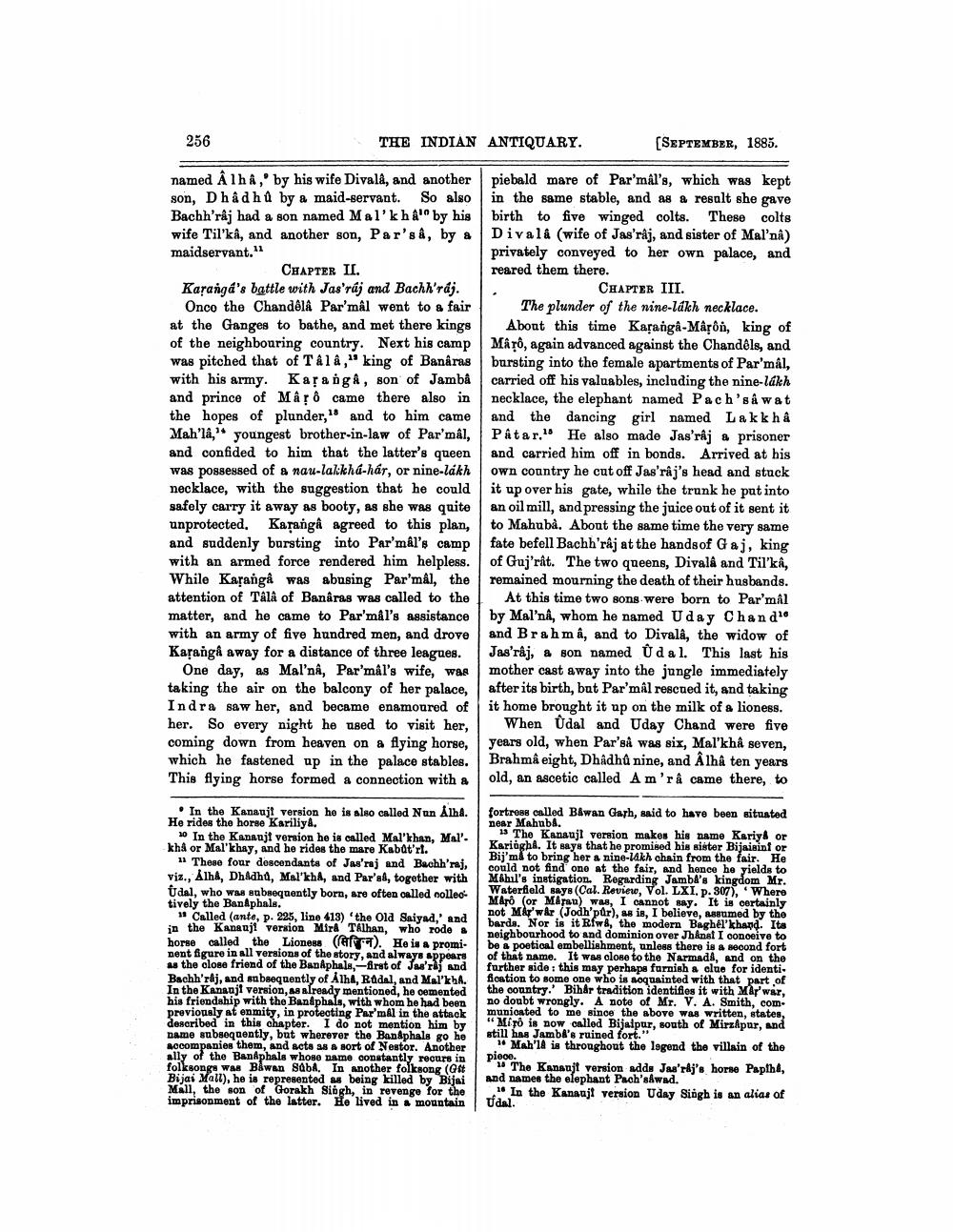________________
256
THE INDIAN ANTIQUARY.
(SEPTEMBER, 1883.
named Alhå, by his wife Divald, and another piebald mare of Par'mal's, which was kept son, Dhad hd by a maid-servant. So also in the same stable, and as a result she gave Bachh'raj had a son named Mal'kh A' by his birth to five winged colts. These colts wife Tilka, and another son, Par'sa, by a Divald (wife of Jas'raj, and sister of Mal'na) maidservant."
privately conveyed to her own palace, and CHAPTER II.
reared them there. Karanga's battle with Jas'rúj and Bachi'raj.
CHAPTER III. Onco the Chandôlå Par'mal went to a fair The plunder of the nine-ldkh necklace. at the Ganges to bathe, and met there kings About this time Karanga-Maron, king of of the neighbouring country. Next his camp Marô, again advanced against the Chandēls, and was pitched that of Tålà," king of Banaras bursting into the female apartments of Par'mal, with his army. Karang & , son of Jamba carried off his valuables, including the nine-lakh and prince of Mârô came there also in necklace, the elephant named Pach'så wat the hopes of plunder, and to him came and the dancing girl named Lakk hâ Mah'la," youngest brother-in-law of Parmál, Påtar. He also made Jas'raj a prisoner and confided to him that the latter's queen and carried him off in bonds. Arrived at his was possessed of a nau-lalikha-hár, or nine-lakh own country he cut off Jas'raj's head and stuck necklace, with the suggestion that he could it up over his gate, while the trunk he put into safely carry it away as booty, as she was quite an oil mill, and pressing the juice out of it sent it unprotected, Karangê agreed to this plan, to Mahuba. About the same time the very same and suddenly bursting into Par'mal's camp fate befell Bachh'raj at the hands of Gaj, king with an armed force rendered him helpless. of Guj'råt. The two queens, Divalâ and Til'kâ, While Karangê was abusing Par'mal, the remained mourning the death of their husbands. attention of Talk of Banâras was called to the At this time two sons were born to Parmal matter, and he came to Par'mal's assistance by Mal'nâ, whom he named Uday Chand with an army of five hundred men, and drove and Brahmâ, and to Divalâ, the widow of Kasangå away for a distance of three leagues. Jas'raj, & son named û dal. This last his
One day, as Mal'nâ, Par'mal's wife, was mother cast away into the jungle immediately taking the air on the balcony of her palace, after its birth, but Par'mâl rescued it, and taking Indra saw her, and became enamoured of it home brought it up on the milk of a lioness. her. So every night he used to visit her, When Udal and Uday Chand were five coming down from heaven on a flying horse, years old, when Par'så was six, Mal'khỉ seven, which he fastened up in the palace stables. Brahma eight, Dhadhû nine, and Ålha ten years This flying horse formed a connection with a old, an ascetic called A m'rå came there, to
In the Kanaujl version he is also called Nun Alha. He rides the horse Kariliya.
10 In the Kananjt version he is called Mal'khan, Mal'. khá or Mal'khay, and he rides the mare Kab
11 These four descendants of Jas'raj and Bachh'raj, viz., Alha, DhAdhd, Mal'khA, and Par's, together with Udal, who was subsequently born, are often called colleotively the Ban&pbals.
11 Called (ante, p. 225, line 413) the Old Saiyad,' and in the Kanauji version Mira Talhan, who rode & horse called the Lioness (ET ). He is a promiDent figure in all versions of the story, and always appears as the close friend of the Bandphals ---Arst of Jae'rly and Bachh'rdj, and subsequently of Ålha, Radal, and Malikha. In the Kanaajt version, as already mentioned, he cemented his friendship with the Bandphals, with whom he had been previously at enmity, in protecting Par'mal in the attack described in this chapter. I do not mention him by name subsequently, but wherever the Banaphals go he accompanies them, and acts as a sort of Nostor. Another ally of the Bandphals whose name constantly recurs in folksongs was Bdwan Sab. In another folksong (G# Bijai Mall), he is represented as being killed by Bijai Máll, the son of Gorakh Sibgh, in revenge for the imprisonment of the latter. He lived in a mountain
fortress called Bawan Garh, said to have been situated near Mahuba.
13 The Kanaujl version makes his name Kariy or KarióghA. It says that he promised his sister Bijnisin or Bij'mi to bring her a nine-lakh chain from the fair. He could not find one at the fair, and hence he yields to Mkhil's instigation. Regarding Jambd's kingdom Mr. Waterfield says (Cal. Review, Vol. LXI. p. 307), Where Mapô (or MArau) was, I cannot say. It is certainly not M&'war (Jodh'pur), as is, I believe, assumed by the barda. Nor is it Rfw8, the modern Baghel'khand. Its neighbourhood to and dominion over Jh&nal I conceive to be & poetical embellishment, unless there is a second fort of that name. It was close to the Narmada, and on the further side : this may perhaps furnish a clue for identi. fication to some one who is aoquainted with that part of the country.' Bihår tradition identifies it with Mar'war, no doubt wrongly. A note of Mr. V. A. Smith, com. munioated to me since the above was written, states, "Miro is now called Bijaipur, south of MirzApur, and still has Jambd's ruined fort.”
** Mah'la is throughout the legend the villain of the piece.
1 The Kansajt version adds Jas'rdj's horse Papihi, and names the elephant Pach'skwad.
In the Kanaajt version Uday Singh is an alias of Udal.




